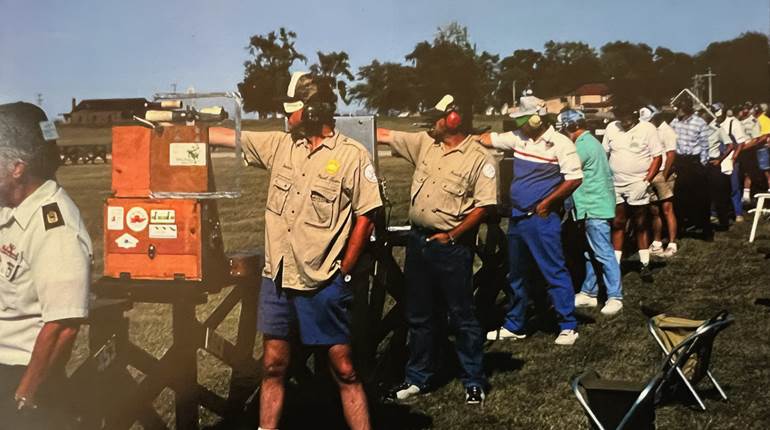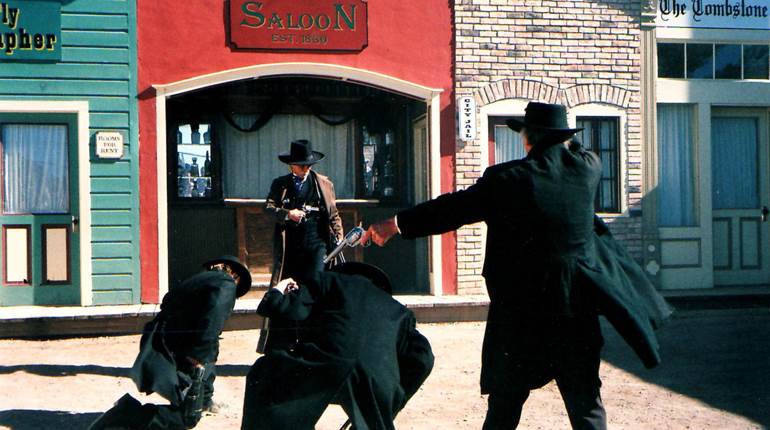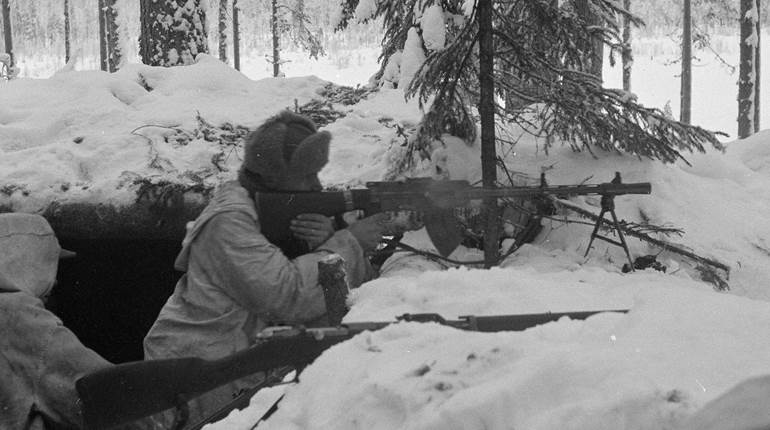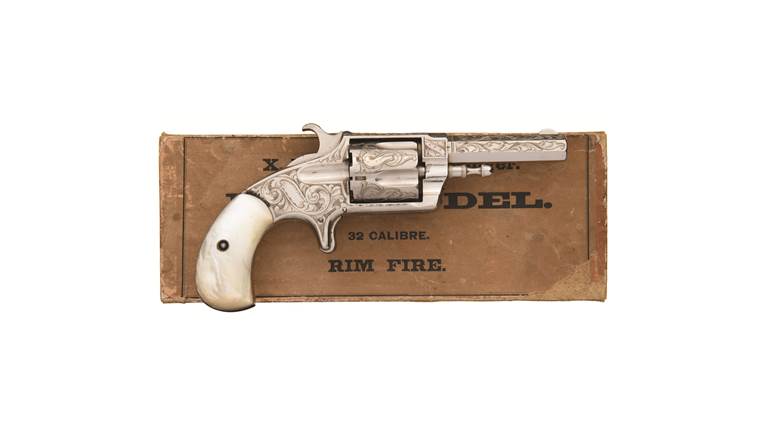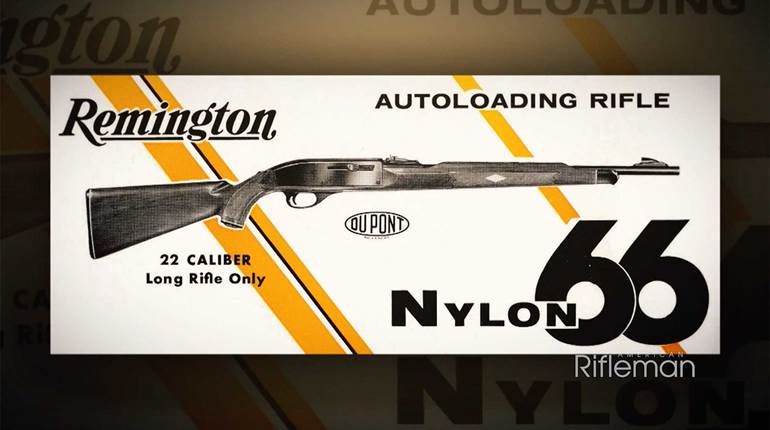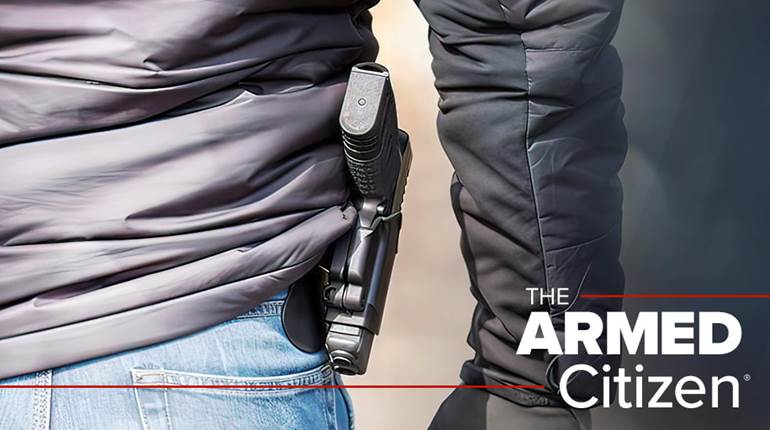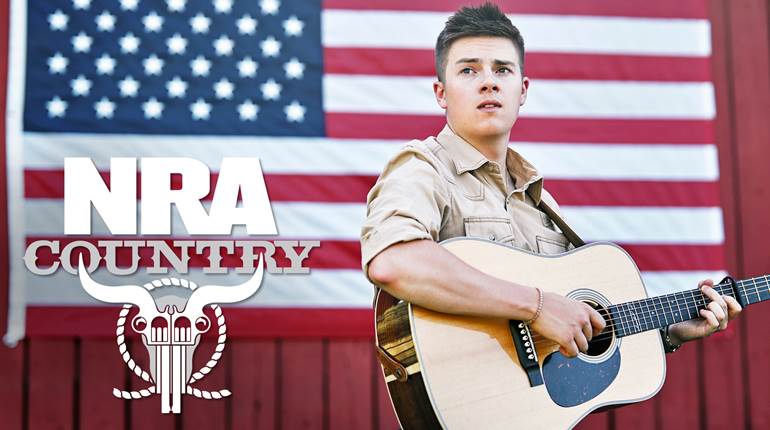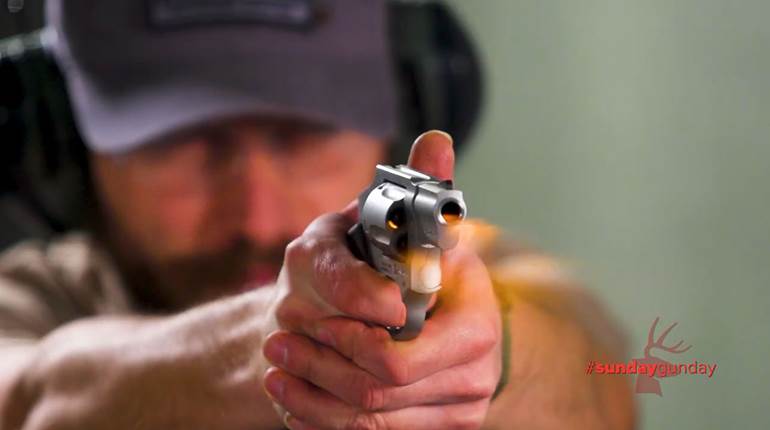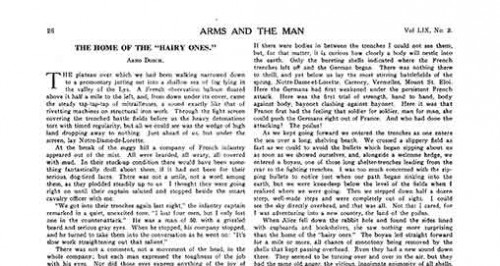
BY ARNO DOSCH
The plateau over which we had been walking narrowed down to a promontory jutting out into a shallow sea of fog lying in the valley of the Lys. A French observation balloon floated above it half a mile to the left, and, from down under its cover, came the steady tap-tap-tap of mitrailleuses, a sound exactly like that of riveting machines on structural iron work. Through the light screen covering the trenched battle fields before us the heavy detonations tore with timed regularity, but all we could see was the wedge of high land dropping away to nothing. Just ahead of us, but under the screen, lay Notre-Dame·de-Lorette.
At the break of the soggy hill a company of French infantry appeared out of the mist. All were bearded, all weary, all covered with mud. In their stuck-up condition there would have been something fantastically droll about them, if it had not been for their serious, dog-tired faces. There was not a smile, not a word among them, as they plodded steadily up to us. I thought they were going right on until their captain saluted and stopped beside the smart cavalry officer with me.
"We got into their trenches again last night," the infantry captain remarked in a quiet, unexcited tone. "I lost four men, but I only lost one in the counter-attack." He was a man of 50, with a grizzled beard and serious gray eyes. When he stopped, his company stopped, and he turned to take them into the conversation as he went on: "It's slow work straightening out that salient."
There was not a comment, not a movement of the head, in the whole company; but each man expressed the toughness of the job with his eyes. Nor did those eyes express anything of the joy of battle. You could see only that it was a tough job and they knew it;  but that it had to be done and they were doing it. I cannot say how they conveyed the idea that they were also going to succeed in doing it, but they made that plain, too.
but that it had to be done and they were doing it. I cannot say how they conveyed the idea that they were also going to succeed in doing it, but they made that plain, too.
All these impressions they gave without saying a word. They did not even speak among themselves. They simply stopped and looked at us, but their eyes showed that they knew exactly what they were doing, and the price in lives they would have to pay, and, somehow, that seemed to make them invincible. Physically they were indifferent, short, stocky men, from whom the spring of youth had entirely gone. Their uniforms, badly fitting in the first place, were pulled out of shape by hard usage. Their trousers, red and gray cloth, and brown corduroy, were plastered with mud. So were their elbows and caps. There was even mud in their beards.
Their captain started on, and they shouldered their rifles and followed. They had given us neither greeting nor farewell; neither a smile nor a frown. But, caught by their silence, we stood and watched them go.
“The poilus,” remarked the smart cavalry officer, his voice stretching out the last syllable, as we turned again toward the battlefield. Before us lay the ditches they call trenches; the great holes left by exploded mines, the slimy, slippery sides of Notre-Dame·de-Lorette.
“They're taking it,” he said, pointing through the mist at the rigid, ditched and muddied fields. “They will take it all, too. The poilus, like that, bumping Germans out of France, yard by yard.”
His tone was not all admiration. There was a bit of contempt in it, too. For he was a regular officer, a professional soldier, and he could not quite accept this unkempt citizen army. “The poilus,” “the bristly, “the unshaven,” “the hairy ones;” you hear the word used in France with so “many intonations, but it is never used without affection. Even the professional soldier's tone expressed that. It usually carries a little affectionate contempt with it, too, such as one has for a faithful old dog. The word was first applied to men like those we had just passed, the territorials and the older reservists, because of their straggly beards. Now that all the French Army has become bristly and unshaven, the word has stretched a little in its meaning: but still when one says “poilu,” one means the territorial, the bearded, nondescript, scrubby-looking soldier--the man who has saved France.
As we went forward we passed more companies of them, bearded, muddy, silent. They had just been relieved from the steady, grinding trench fighting, and were going back a few miles to baths, dominoes and rest.
Just before we reached the bottom of the hill the mist lifted higher and I could see for miles across the new wonderland, the battle line of the trenches. A very disappointing place to look at it is, too, merely ridges of dirt running in all directions over the uneven fields. There was nothing dramatic, nothing even horrible.
If there were bodies in between the trenches I could not see them, but, for that matter, it is curious how closely a body will nestle into the earth. Only the bursting shells indicated where the French trenches left off and the German began. There was nothing there to thrill, and yet below us lay the most stirring battlefields of the spring. Notre-Dame-et-Lorette, Carency, Vermelles. Mount St. Eloi. Here the Germans had first weakened under the persistent French attack. Here was the first trial of strength, hand to hand, body against body, bayonet clashing against bayonet. Here it was that France first had the feeling that soldier for soldier, man for man, she could push the Germans right out of France. And who had done the attacking? The poilus!
As we kept going forward we entered the trenches as one enters the sea over a long, shelving beach. We crossed a slippery field as fast as we could to avoid the bullets which began zipping about us as soon as we showed ourselves, and, alongside a welcome hedge, we entered a boyau, one of those long shelter-trenches leading from the rear to the fighting trenches. I was too much concerned with the zipping bullets to notice just when our path began sinking into the Earth, but we were knee-deep below the level of the fields when I realized where we were going. Then we stepped down half a dozen steep, well-made steps and were completely out of sight. I could see the sky directly overhead, and that was all. Not that l cared, for I was adventuring into a new country, the land of the poilus.
When Alice fell down the rabbit hole and found the sides lined with cupboards and bookshelves, she saw nothing more surprising than the home of the “hairy ones.” The boyau led straight forward for a mile or more, all chance of monotony being removed by the shells that kept passing overhead. Even they had a new sound down there. They seemed to be turning over and over in the air, but they had the same old anger, the vicious, inanimate animosity of all shells.
Some of the shrapnel broke overhead, the stinging, bumble-bee bullets kicking mud all over us, so we looked quite at home in the land of the poilus.
All at once we came upon a dent in the side of the trench, and a hole in the dent. Inside was a small chamber, well underground, filled with mitrailleuse and rifle ammunition. Some of the poilus were carrying boxes forward; a healthy, cheerful lieutenant smoking a briar pipe in a dent opposite was keeping a record. He sat humming at his work, and was evidently quite contented. I sat down for a while with him in his blockhouse, toasting my shins before his charcoal burner, drier and warmer than I had been for several days, and tried to stretch my minutes there into weeks and months. I had just reached the conclusion that this trench warfare was not so bad after all, when two of the poilus passed down the boyau, carrying a third on a stretcher between them. He was lying stiffly on his face, his muddy legs and boots stretched stiffly out behind. He still had on his coat, his usual graceless tailed garment which makes the most dashing French soldier look utterly commonplace, and on him it only touched commonplaceness with misery. I never realized before how much difference a badly fitting coat could make. That corpse was grotesque.
A second passed lying on his back, his cap pulled down over his eyes, but his bearded chin bare to the sky. It was thrust forward defiantly, just as it had been caught in the moment of death. His lips were parted, too, as if he were just about to cry out. With the stiffed cry in his throat, forever baffled, he was now being carried out to a shallow grave. Perhaps that last cry was to those he left at home.
Three months later they would know that he was dead. Then they would accept it bitterly behind closed doors, and face the world with dry eyes. That cry would never pass the tightly drawn throat. It is hard to forget it struggling for utterance.
There was a third body, and it was almost standing on its head. The soldier who had passed up out of that grotesque had doubled over in terrible pain and grasped at his bowels. But there were only fragments and ends of bowels to grasp at, for a piece of hurtling shrapnel shell had torn completely through them. His body had grown rigid in that position and now it would not lie down on the stretcher.
It required a third poilu to steady it on the stretcher that two others were carrying. It was difficult to believe that it had ever been a human body. In its ungainly attitude, its legs humped up in the air, its red trousers stiff with mud, it looked like a uniform stuffed with straw. It gave the effect of a scarecrow.
A mean fate that did not even permit the poilus to be dignified in death!
As I went forward, I was under the impression that we were constantly getting deeper into the Earth, though we were really passing under level fields. It was we who were getting deeper into the trenches, because we were no longer walking upright. We were close enough now to be in range of the rifle bullets from the German trenches, and they pinged constantly over our heads. There was a ridge of dirt between to protect us, but the unconscious effect on us was to make us lose about a foot apiece in height. A lieutenant who had joined us in the trenches explained that it was just as well to keep our heads below the line of the fields, as the Germans opposite occupied themselves by shooting at the same points in the parapets with reversed bullets until they opened a hole.
The home of the “hairy ones” was an orderly place. Each boyau and each trench was named. The commanders' points of observation were carefully indicated, and the way to all the blockhouses containing ammunition was indicated by arrows. At the second line of trenches the lieutenant remarked that we were about 50 yards from the Germans. It was a moment of comparative stillness. The rifle shooting seemed to have stopped. There was only the regular tap-tap-tap of the mitrailleuse. This went on mechanically. A dozen rapid shots, and then a rest; another dozen, and a rest again. I was counting them mechanically, when the silence grew so intense close around us that I knew without being told something was about to happen. Coming down the communicating trench behind us was a string of soldiers, and they stopped, too.
“What is --?” I started to ask, and the silence broke. It was shattered, splintered, torn to millions of fragments and driven into my ears. In a second it was over and I was surprised to find myself still on my feet. It was shattered again in another second, and again and again, and there was no more silence at all after that as the rifles took it up and the mitrailleuses changed from a tap-tap to a whirr. I looked around at the men in sight and saw that they were passing forward a long, curved, jagged piece of cast iron, a piece of bomb. It had passed over the head of a particularly hairy little poilu. “Brave little Shorty,” “That’s the time you were glad you were not tall,” they joked with him, and he grinned and held his hand over his head to show where it had passed.
A zig-zag brought us up to the forward trench. "Faire feu," I could hear before I was really in it, and, even above the racket of rifles I could hear the clear tone of the commanding lieutenant's voice. “Feu.” Over and over this was repeated, the poilus pumping their rifles as steadily as at drill. I forgot then their absurd coats, their murderous trousers, the mud in their beards.
When the order came to stop, we made our way along the trench, past the riflemen stepping down from their firing positions and turning bloodshot eyes on us. They were as grim and silent as ever, but each man looked up and down the line to see if all had escaped the return fire. All had in that trench. In fact, the German fire had been light. The French had only opened fire to show the Germans they were in good order and willing to receive a bayonet attack following the trench bombs. But the Germans were apparently content with the bombs.
“How far are we from the Germans?” I asked the nearest poilu.
“Look,” he said, pointing to the loophole through which he had been firing. I would have been perfectly willing to take his word for it, but I gave one hasty look. Just in front there was a stretch of perhaps 75 feet of field with new grass springing up, and then the parapet of the first German trench. It would have been no trouble at all to throw a rock into the first line of the German trenches.
“Near enough?” laughed the poilu, as I stepped hastily down. I told him it was as near as I wanted to get. “But we shall be nearer soon,” he remarked. “For seven months we have been creeping up on them, and they cannot hold us much longer. They were blind when they attacked us. Because they were ready and we were not, they thought they could wipe us out. They did not know whom they were fighting, or they would have realized no Frenchman could rest while a German soldier remained on French soil. We have been winning it all back inch by inch and we will go on winning it back if we have to creep underground and blow up their trenches every
20 yards from here to the Ardennes.”
He spoke with a fierce intensity and a volubility that made up for all the silent poilus I had seen that day. The fact that the German soldiers were only 75 feet away in their trenches seemed to be neither here nor there. I could imagine them, though I could not even see the point of a helmet, big, blond, well-fleshed young Bavarians, admirable-looking soldiers; but they did not seem a menace at that moment. It was they who were menaced. The spirit of the man beside me made me feel that the trench in which I stood was a comparatively safe place. And yet he was only a middle-aged man in a badly fitting coat and sloppy trousers, and he needed a shave. But, as he spoke, his eyes shone and his jaws squared under the stubble
He was not much to look at, perhaps, but he was a patriot after an American’s own heart.--The Forum












